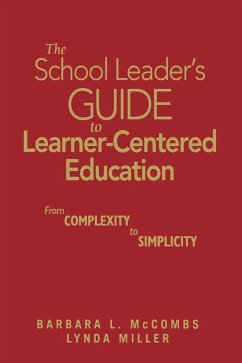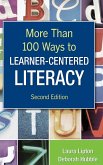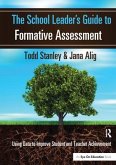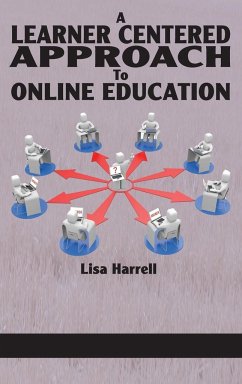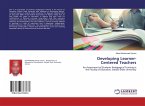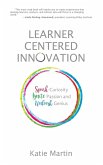Barbara L. Mccombs, Lynda Miller
The School Leader's Guide to Learner-Centered Education
From Complexity to Simplicity
Barbara L. Mccombs, Lynda Miller
The School Leader's Guide to Learner-Centered Education
From Complexity to Simplicity
- Gebundenes Buch
- Merkliste
- Auf die Merkliste
- Bewerten Bewerten
- Teilen
- Produkt teilen
- Produkterinnerung
- Produkterinnerung
This innovative resource introduces a transformative leadership model that supports student development by focusing on key factors such as cognition, metacognition, motivation, affect, and individual differences.
Andere Kunden interessierten sich auch für
![More Than 100 Ways to Learner-Centered Literacy More Than 100 Ways to Learner-Centered Literacy]() Laura LiptonMore Than 100 Ways to Learner-Centered Literacy80,99 €
Laura LiptonMore Than 100 Ways to Learner-Centered Literacy80,99 €![Merging the Instructional Design Process with Learner-Centered Theory Merging the Instructional Design Process with Learner-Centered Theory]() Charles M. ReigeluthMerging the Instructional Design Process with Learner-Centered Theory203,99 €
Charles M. ReigeluthMerging the Instructional Design Process with Learner-Centered Theory203,99 €![The School Leader's Guide to Formative Assessment The School Leader's Guide to Formative Assessment]() Todd StanleyThe School Leader's Guide to Formative Assessment159,99 €
Todd StanleyThe School Leader's Guide to Formative Assessment159,99 €![A Learner Centered Approach to Online Education (Hc) A Learner Centered Approach to Online Education (Hc)]() Lisa HarrellA Learner Centered Approach to Online Education (Hc)108,99 €
Lisa HarrellA Learner Centered Approach to Online Education (Hc)108,99 €![The Process-Centered School The Process-Centered School]() Arthur L. CostaThe Process-Centered School85,99 €
Arthur L. CostaThe Process-Centered School85,99 €![Developing Learner-Centered Teachers Developing Learner-Centered Teachers]() Musa Muhammad UsmanDeveloping Learner-Centered Teachers29,99 €
Musa Muhammad UsmanDeveloping Learner-Centered Teachers29,99 €![Learner-Centered Innovation Learner-Centered Innovation]() Katie MartinLearner-Centered Innovation38,99 €
Katie MartinLearner-Centered Innovation38,99 €-
-
-
This innovative resource introduces a transformative leadership model that supports student development by focusing on key factors such as cognition, metacognition, motivation, affect, and individual differences.
Hinweis: Dieser Artikel kann nur an eine deutsche Lieferadresse ausgeliefert werden.
Hinweis: Dieser Artikel kann nur an eine deutsche Lieferadresse ausgeliefert werden.
Produktdetails
- Produktdetails
- Verlag: Corwin
- Seitenzahl: 290
- Erscheinungstermin: 1. August 2008
- Englisch
- Abmessung: 260mm x 183mm x 20mm
- Gewicht: 745g
- ISBN-13: 9781412960168
- ISBN-10: 1412960169
- Artikelnr.: 23516983
- Herstellerkennzeichnung
- Produktsicherheitsverantwortliche/r
- Europaallee 1
- 36244 Bad Hersfeld
- gpsr@libri.de
- Verlag: Corwin
- Seitenzahl: 290
- Erscheinungstermin: 1. August 2008
- Englisch
- Abmessung: 260mm x 183mm x 20mm
- Gewicht: 745g
- ISBN-13: 9781412960168
- ISBN-10: 1412960169
- Artikelnr.: 23516983
- Herstellerkennzeichnung
- Produktsicherheitsverantwortliche/r
- Europaallee 1
- 36244 Bad Hersfeld
- gpsr@libri.de
Barbara L. McCombs directs the Human Motivation, Learning, and Development Center at the University of Denver. The center focuses on the professional development of educators, personal and organizational change, systemic educational reform, and school violence prevention. McCombs' current research is directed at new leadership models for redesigning outdated views of schooling and learning. This research has led to her international and national recognition in areas that include transformational teacher development approaches, motivating hard-to-reach students, and the use of technology as a primary tool for empowering youth and facilitating relevant learning. The author has begun a series of books published by Corwin Press. Learner-Centered Classroom Practices and Assessments: Maximizing Student Motivation, Learning, and Achievement (2006) was co-authored with Lynda Miller and written for teachers. Her second book in the series, written for school administrators and other school leaders, was also co-authored with Lynda Miller and is titled A School Leader's Guide to Creating Learner-Centered Education: From Complexity to Simplicity (2008). McCombs is the primary author of Learner-Centered Psychological Principles (LCPs): Guidelines for School Redesign and Reform. She has developed research-validated learner-centered models of teaching and learning based on the LCPs. Through collaborations with colleagues at the University of Bristol in England, she developed an online version of her Assessment of Learner-Centered Practices (ALCP) teacher and student surveys. These surveys have been validated with over 35,000 students and their teachers in Grades K-3, 4-8, 9-12, and college level. The ALCP surveys are being used in numerous national and international K-12 schools as well as colleges.
Acknowledgments About the Authors 1. Why This Is a Time for Change Why Read This Book? Schools as Living Systems What Does "Learner-Centered" Mean? How This Book Is Organized How Do You Like to Learn? 2. What We Know About Learning and Leading What Kind of Learner and Leader Are You? What Does Existing Evidence Say About Leadership? The "Big Picture" View: An Ecology of Learning Model What It Means to Be Learner-Centered A Learner-Centered Educational Model What Are the New Notions of Schooling as Part of Living Systems? Self-Reflections What
s Next 3. What the Learner-Centered Model Means for Practice What It Means to Be a Learner-Centered Leader What the Research Shows About the Effectiveness of Learner-Centered Models How the Learner-Centered Principles Translate Into Practice at the School Level Implications for Leadership and Building Communities of Learners Self-Reflections What
s Next 4. The Tools Needed for the Journey Tools for the Journey Within Tools for a School-Level Assessment System and Leadership Process Implications of Implementing Learner-Centered Leadership Tools Tools for Answering the Truly Important Questions Self-Assessment and Reflection Tools to Chart the Journey Self-Reflections What
s Next 5. What Learner-Centered Assessment Tools Can Accomplish What Is Expected of Our Educational System? How School Leaders Can Provide What Is Wanted The Big Issues Facing Today
s School Leaders The Leader
s New Role in Staff Development Background and Supporting Research for the Assessment of Learner-Centered Practices Surveys Experiencing the School-Level Assessment of Learner-Centered Practices Survey for Yourself Self-Reflections What
s Next 6. How We Can Move Toward New Student and System Outcomes Understanding What Is and What Could Be Aligning the New Vision With Existing Realities Dealing With Current System Inequities in New Systems Designs The Learning Partnerships and Networks That We Need The Learning Partnerships You Will Need Self-Reflections What
s Next 7. How We Develop Leadership Qualities From Within New Ideas From Brain Research Preparing for the Future Other Characteristics of the Needed Framework Further Leadership Challenges in Creating Learner-Centered Models What It Means to Develop Capacity From Within A Summary: Moving From Complexity to Simplicity Summary Conclusion Self-Reflections Introduction to Summary Chapter Introduction to Additional Resources 8. Summary of Major Points in Each Chapter Chapter 1: Why This Is a Time For Change Chapter 2: What We Know About Learning and Leading Chapter 3: What the Learner-Centered Model Means for Practice Chapter 4: The Tools Needed for the Journey Chapter 5: What the Learner-Centered Assessment Tools Can Accomplish Chapter 6: How We Can Move Toward New Student and System Outcomes Chapter 7: How We Can Develop Leadership Qualities From Within Appendix Resources Glossary of Learner-Centered Terms References Index
s Next 3. What the Learner-Centered Model Means for Practice What It Means to Be a Learner-Centered Leader What the Research Shows About the Effectiveness of Learner-Centered Models How the Learner-Centered Principles Translate Into Practice at the School Level Implications for Leadership and Building Communities of Learners Self-Reflections What
s Next 4. The Tools Needed for the Journey Tools for the Journey Within Tools for a School-Level Assessment System and Leadership Process Implications of Implementing Learner-Centered Leadership Tools Tools for Answering the Truly Important Questions Self-Assessment and Reflection Tools to Chart the Journey Self-Reflections What
s Next 5. What Learner-Centered Assessment Tools Can Accomplish What Is Expected of Our Educational System? How School Leaders Can Provide What Is Wanted The Big Issues Facing Today
s School Leaders The Leader
s New Role in Staff Development Background and Supporting Research for the Assessment of Learner-Centered Practices Surveys Experiencing the School-Level Assessment of Learner-Centered Practices Survey for Yourself Self-Reflections What
s Next 6. How We Can Move Toward New Student and System Outcomes Understanding What Is and What Could Be Aligning the New Vision With Existing Realities Dealing With Current System Inequities in New Systems Designs The Learning Partnerships and Networks That We Need The Learning Partnerships You Will Need Self-Reflections What
s Next 7. How We Develop Leadership Qualities From Within New Ideas From Brain Research Preparing for the Future Other Characteristics of the Needed Framework Further Leadership Challenges in Creating Learner-Centered Models What It Means to Develop Capacity From Within A Summary: Moving From Complexity to Simplicity Summary Conclusion Self-Reflections Introduction to Summary Chapter Introduction to Additional Resources 8. Summary of Major Points in Each Chapter Chapter 1: Why This Is a Time For Change Chapter 2: What We Know About Learning and Leading Chapter 3: What the Learner-Centered Model Means for Practice Chapter 4: The Tools Needed for the Journey Chapter 5: What the Learner-Centered Assessment Tools Can Accomplish Chapter 6: How We Can Move Toward New Student and System Outcomes Chapter 7: How We Can Develop Leadership Qualities From Within Appendix Resources Glossary of Learner-Centered Terms References Index
Acknowledgments About the Authors 1. Why This Is a Time for Change Why Read This Book? Schools as Living Systems What Does "Learner-Centered" Mean? How This Book Is Organized How Do You Like to Learn? 2. What We Know About Learning and Leading What Kind of Learner and Leader Are You? What Does Existing Evidence Say About Leadership? The "Big Picture" View: An Ecology of Learning Model What It Means to Be Learner-Centered A Learner-Centered Educational Model What Are the New Notions of Schooling as Part of Living Systems? Self-Reflections What
s Next 3. What the Learner-Centered Model Means for Practice What It Means to Be a Learner-Centered Leader What the Research Shows About the Effectiveness of Learner-Centered Models How the Learner-Centered Principles Translate Into Practice at the School Level Implications for Leadership and Building Communities of Learners Self-Reflections What
s Next 4. The Tools Needed for the Journey Tools for the Journey Within Tools for a School-Level Assessment System and Leadership Process Implications of Implementing Learner-Centered Leadership Tools Tools for Answering the Truly Important Questions Self-Assessment and Reflection Tools to Chart the Journey Self-Reflections What
s Next 5. What Learner-Centered Assessment Tools Can Accomplish What Is Expected of Our Educational System? How School Leaders Can Provide What Is Wanted The Big Issues Facing Today
s School Leaders The Leader
s New Role in Staff Development Background and Supporting Research for the Assessment of Learner-Centered Practices Surveys Experiencing the School-Level Assessment of Learner-Centered Practices Survey for Yourself Self-Reflections What
s Next 6. How We Can Move Toward New Student and System Outcomes Understanding What Is and What Could Be Aligning the New Vision With Existing Realities Dealing With Current System Inequities in New Systems Designs The Learning Partnerships and Networks That We Need The Learning Partnerships You Will Need Self-Reflections What
s Next 7. How We Develop Leadership Qualities From Within New Ideas From Brain Research Preparing for the Future Other Characteristics of the Needed Framework Further Leadership Challenges in Creating Learner-Centered Models What It Means to Develop Capacity From Within A Summary: Moving From Complexity to Simplicity Summary Conclusion Self-Reflections Introduction to Summary Chapter Introduction to Additional Resources 8. Summary of Major Points in Each Chapter Chapter 1: Why This Is a Time For Change Chapter 2: What We Know About Learning and Leading Chapter 3: What the Learner-Centered Model Means for Practice Chapter 4: The Tools Needed for the Journey Chapter 5: What the Learner-Centered Assessment Tools Can Accomplish Chapter 6: How We Can Move Toward New Student and System Outcomes Chapter 7: How We Can Develop Leadership Qualities From Within Appendix Resources Glossary of Learner-Centered Terms References Index
s Next 3. What the Learner-Centered Model Means for Practice What It Means to Be a Learner-Centered Leader What the Research Shows About the Effectiveness of Learner-Centered Models How the Learner-Centered Principles Translate Into Practice at the School Level Implications for Leadership and Building Communities of Learners Self-Reflections What
s Next 4. The Tools Needed for the Journey Tools for the Journey Within Tools for a School-Level Assessment System and Leadership Process Implications of Implementing Learner-Centered Leadership Tools Tools for Answering the Truly Important Questions Self-Assessment and Reflection Tools to Chart the Journey Self-Reflections What
s Next 5. What Learner-Centered Assessment Tools Can Accomplish What Is Expected of Our Educational System? How School Leaders Can Provide What Is Wanted The Big Issues Facing Today
s School Leaders The Leader
s New Role in Staff Development Background and Supporting Research for the Assessment of Learner-Centered Practices Surveys Experiencing the School-Level Assessment of Learner-Centered Practices Survey for Yourself Self-Reflections What
s Next 6. How We Can Move Toward New Student and System Outcomes Understanding What Is and What Could Be Aligning the New Vision With Existing Realities Dealing With Current System Inequities in New Systems Designs The Learning Partnerships and Networks That We Need The Learning Partnerships You Will Need Self-Reflections What
s Next 7. How We Develop Leadership Qualities From Within New Ideas From Brain Research Preparing for the Future Other Characteristics of the Needed Framework Further Leadership Challenges in Creating Learner-Centered Models What It Means to Develop Capacity From Within A Summary: Moving From Complexity to Simplicity Summary Conclusion Self-Reflections Introduction to Summary Chapter Introduction to Additional Resources 8. Summary of Major Points in Each Chapter Chapter 1: Why This Is a Time For Change Chapter 2: What We Know About Learning and Leading Chapter 3: What the Learner-Centered Model Means for Practice Chapter 4: The Tools Needed for the Journey Chapter 5: What the Learner-Centered Assessment Tools Can Accomplish Chapter 6: How We Can Move Toward New Student and System Outcomes Chapter 7: How We Can Develop Leadership Qualities From Within Appendix Resources Glossary of Learner-Centered Terms References Index

